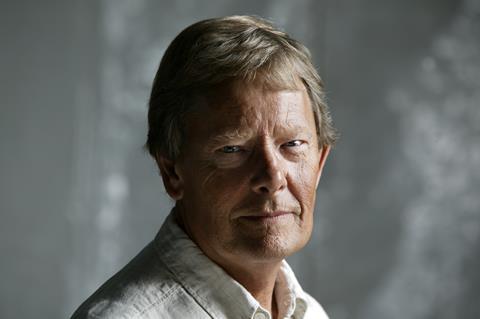
Figures from the UK and international industry have been paying tribute to the beloved former Guardian, Screen International and Evening Standard film critic Derek Malcolm, who died aged 91 at the weekend.
“Derek Malcolm was a great critic and a true friend of the Venice Film Festival. Even at the Lido he exercised his great curiosity and sensitivity towards global cinema. It’s a big loss for film culture,” Alberto Barbera, artistic director of the Vernice Film Festival, told Screen.
Legendary US documentary maker Fred Wiseman reminisced both about his encounters with Malcolm at festivals and his fierce rivalry with the film critic on the tennis court. “We were both very competitive and made fun of each other. He was a lovely, charming, funny, intelligent man,” said Wiseman.
The friendship between Wiseman and Malcolm dated back to the early 1970s when Wiseman showed one of his documentaries at the London Film Festival and Malcolm interviewed him after the screening. The critic was a big admirer of Wiseman’s films, especially Welfare and Juvenile Court, and Wiseman would always look him up when passing through London. Often, they played tennis.
“We played both doubles and singles. He belonged to some club in London, in Highgate or somewhere. I remember when we walked through the club, Derek knew everybody there. Both when we played doubles and singles, it was very competitive - with the other people and each other.”
Wiseman praised Malcolm’s film criticism. “He didn’t use any jargon. There was none of the French structuralist lit crit bullshit. He wrote extremely clearly and succinctly - and I am not saying that just because he liked my films. I read a lot of his other reviews and it was always crisp and to the point.”
Renowned UK filmmaker Mike Leigh lauded Malcolm for his deep knowledge of international filmmakers. “[He] was not only unique among film critics in his insight and taste, but he was serious in his commitment to serious independent filmmakers, not least young unknowns. His knowledge of World Cinema was immense, and he was an extremely nice guy, with a charming dry sense of humour.”
UK distributors and programmers highlighted how crucial Malcolm’s support in The Guardian, where he was the film critic from 1971 to 1997, was to the fates of their films in a pre-internet era.
“He knew the influence he had,” said Robert Beeson, the head of New Wave Films and former managing director of Artificial Eye, of Malcolm. ”Under all his jokiness, he was really concerned to promote arthouse films.”
Beeson cited specific examples of debut features such as Tran Anh Hung’s Vietnamese-language The Scent Of Green Papaya which Malcolm championed in The Guardian in 1993 - and which found sizeable UK audiences partly as a result. “He was the most consciously supportive of critics. He knew what influence his reviews would have in those pre-internet days. It was [a period when] The Guardian and Time Out, those two [publications] could make or break a movie.”
Beeson also noted his generosity to younger reviewers. “A lot of people have said how kind he was when they were starting out.”
Heather Stewart, the former creative director of the British Film Institute, hailed Malcolm’s largely unsung work with the British Federation of Film Societies (now known as Cinema For All) in promoting film going across every part of the UK.
“At that point pre-VHS but actually still today, there are lots of people whose only opportunity to see a film on a screen is in a film society because they are living in rural cinematic poverty,” said Stewart. “In the 70s and 80s, if you wanted to know about arthouse cinema, you’d have to book films from the BFI…Derek was very committed to people being able to see arthouse cinema across the UK. Hundreds of thousands of people would have done so because of that commitment.
I do applaud him for that. It’s small scale stuff but people on the island of Unst, the northern most island of Shetland, and all over the place were getting to see films because of that Federation of Film Societies. He really put his money where his moth was in terms of people being able to see stuff, not just read some review in The Guardian.”

Producer and former Palace Pictures head Stephen Woolley recalled the period when he was involved in running the Scala and the Other Cinema in London. “We really needed Derek’s support… for all the movies we released, Derek was vital. This was an age when Derek was so important, an age when the arts weren’t being covered as extensively as they are now and it was mainly one or two important newspapers that dictated [what people saw]. The Guardian was essential because it was known as the arts newspaper,” Woolley said.
“Derek was probably the most important critic for any distributor of independent or international films. Because he had such a love of global cinema - you think of Satyajit Ray and Robert Bresson and all the filmmakers Derek supported - he gave a global aspect to his reviews which nobody else [at that time] seemed to have much a care about.”
Producer Don Boyd spoke of the way Malcolm supported independent UK filmmaking in the 1970s and 1980s including the films of Derek Jarman and Alan Clarke, produced by Boyd.
”Some of his reviews of my work were wonderful and some were not so wonderful,” Boyd said. He recalled a Guardian article in which Malcolm referred to him as “a phoenix rising from the ashes” at a point when the British film industry was on its knees and he was fighting to get films like Scum (1979) and The Great Rock ’n’ Roll Swindle (1980) off the ground. Malcolm subsequently invited him to take part in a Guardian lecture at the National Film Theatre and gave him the opportunity to talk in depth about his work.
“He took an interest in the politics of the industry, the budgets, the way films got made, what happened on the sets, who had power and who didn’t,” said Boyd. “He always somehow managed to integrate that [into his reviews].”
Boyd last saw Malcolm last year at the Chichester Film Festival. “There he was in his early 90s at a tiny film festival, speaking passionately to promote the idea that small cinemas had to survive and were an important part of the community. He was as energetic intellectually and in terms of his quite scurrilous take on the industry generally speaking.”
Gillies MacKinnon, the UK director of Small Faces andHideous Kinky, praised Malcolm’s lack of bias.
“It may be unusual for a filmmaker to be able to say of a critic - I think of him with great affection. Remembering him as a critic, he was honest and fair and his reviews were thoughtful and considered. I never recall him saying anything lazy or stupid and he seemed a critic who had thought about what he said before he said it.”

























1 Readers' comment